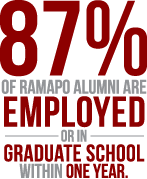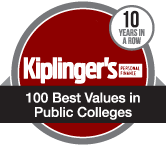College Catalog: 2013-2014
School of Theoretical and Applied Science (TAS): Bioinformatics (B.S.)
Website: School of Theoretical and Applied Science
Convener:
Faculty:
Bioinformatics is a modern interdisciplinary science that uses computational techniques to frame and to resolve biological problems. Bioinformatics allows scientists to answer questions which require the interpretation of large datasets and to detect trends in data that emerge when a “bigger picture” is considered. This effective management of biological data allows scientists to create molecular models, discover genes, assign functions to newly discovered genes, and to study relationships like the structure and function of proteins. Bioinformatics is practiced in the fields of molecular, personalized and preventative medicine, biotechnology and nanobiotechnology. Applying this powerful new technology can help to prevent, diagnose and treat inherited and other diseases, design new drugs and vaccines, shorten the development cycle of new medicines and much more.
Bioinformatics is a rapidly growing and evolving field. Opportunities exist to join the forefront of research in industry as well as academic institutions. Northern New Jersey/New York area is a hub for the pharmaceutical industry and one of the largest centers of biotechnology. Several institutions of higher education are also located in the region. Ramapo College is well-suited for a Bioinformatics program because it is proximal to institutions of higher education and companies that have high priority programs in Bioinformatics.
Ramapo College is one of the first primarily undergraduate colleges in the United States to offer a baccalaureate degree in Bioinformatics. The curriculum for this program has been designed to lay a solid multidisciplinary foundation in modern life sciences, chemistry, mathematics, as well as cutting-edge computer technology using informatics as an interdisciplinary cohesive tool. In advanced courses, students are trained to manage biological data, develop computational methods to analyze and interpret data, solve scientific problems and make new discoveries. In addition to the scientific and technical concepts, students are also exposed to the social, business, and ethical aspects of science. This career-oriented program prepares the students for employment in industry and academia, to pursue graduate education, for careers in medicine and related disciplines, and engage in research in this technological field of great demand.
Highly qualified and experienced educators teach courses in the Bioinformatics curriculum. The faculty members are actively engaged in research and typically involve undergraduate students in their projects. Students are also encouraged to present their findings at research conferences and publish their accomplishments in peer reviewed scientific journals.
Supporting academic programs with the technology necessary for their success is a top priority at Ramapo College. The College has well-maintained modern laboratories for biology, molecular biology, biochemistry, genetics, chemistry and physics that are used for the Bioinformatics program. Most of these laboratories are equipped with modern computers with Internet connections. In addition, two ultramodern labs have been specially designed to teach Bioinformatics courses. The college also boasts over forty different PC and Mac based computer labs across the campus, with over 700 PCs and Macs for student use. In addition to email and web page space for students, a high end Sun System supports more advanced computing needs for faculty and students. Several servers have also been dedicated to Bioinformatics teaching and research.
The Major is offered by the School of Theoretical and Applied Science and leads to a B.S. degree in Bioinformatics.
Curriculum for the Bioinformatics Major:
In order to graduate with a B.S. in Bioinformatics from Ramapo College, a student will have to earn a total of 128 credits. In addition to 72 credits of the core subjects, students pick 12 credits from two sets of specialized electives. Additionally, Fundamentals of Physics I and II courses are highly recommended for Bioinformatics majors. There is also a provision for students to opt for Bioinformatics research that can be performed under the guidance of one of the faculty members of the program as TAS Research Honors, or taken as Co-Op/Internship in a suitable industry in the area.
- Transfer students who have 48 or more credits accepted at the time of transfer are waived from the courses marked with a (W) below. Waivers only apply to General Education Requirements NOT School Core or Major Requirements.
- Double counting between General Education, School Core, and Major may be possible. Check with your advisor to see if any apply.
- Writing Intensive Requirement (six courses): three writing intensive courses in the general education curriculum are required: First Year Seminar, Critical Reading and Writing (formerly College English), and Readings in the Humanities; the other three courses are taken in the major.
BIOINFORMATICS MAJOR
- Subject & Course # – Title & Course Description
- GENERAL EDUCATION REQUIREMENTS
- INTD 101 - FIRST YEAR SEMINAR (W)
- SELECT ONE – (W) BADM 115 - PERSPECTIVES OF BUSINESS AND SOCIETY OR
- (W) SOSC 101 - SOCIAL ISSUES
- CRWT 102 - CRITICAL READING & WRITING II (was ENGL 180)
- AIID 201 - READINGS IN THE HUMANITIES (W)
- SELECT ONE – (W) - GE-HISTORY CATEGORY: HIST 101-110
- SELECT ONE – - GE-INTERCULTURAL NORTH AMERICA CATEGORY
- SELECT ONE – - GE-INTERNATIONAL ISSUES CATEGORY
- SELECT ONE – (W) - GE-TOPICS ARTS AND HUMANITIES CATEGORY OR
- (W) - GE-TOPICS SOCIAL SCIENCE CATEGORY
- SCHOOL OF THEORETICAL AND APPLIED SCIENCE REQUIREMENT
- SELECT ONE – Science In Cultural Perspective course list *:
- AMER 307 - TECHNOLOGY AND CULTURE IN AMERICA
- ANTH 307 - MEDICAL ANTHROPOLOGY
- CNTP 315 - ART ON THE INTERNET
- COMM 307 - ENVIRONMENTAL WRITING
- ENST 215 - ENVIRONMENTAL HISTORY
- ENST 223 - ENERGY AND SOCIETY
- ENST 305 - ECOLOGY, ECONOMICS AND ETHICS
- ENST 312 - ECOLOGICAL ANTHROPOLOGY
- ENST 313 - APPROPRIATE TECHNOLOGY
- ENST 317 - ENVIRONMENTAL POLICY AND REGULATION
- HIST 396 - HISTORY OF SCIENTIFIC IDEAS
- INFO 315 - COMPUTER LAW AND ETHICS
- LAWS 390 - TOPICS:
- MATH 441 - HISTORY OF MATH
- MGMT 324 - INVENTION FOR MANAGERS AND SCI
- PHIL 322 - PHILOSOPHY OF SCIENCE
- PHIL 328 - BIOETHICS
- PSYC 306 - ETHICAL AND LEGAL ISSUES
- PSYC 423 - HISTORY AND SYSTEMS OF PSYCHOLOGY
- SCIN 210 - SCIENCE, TECHNOLOGY, AND SOCIETY
- SCIN 230 - COMPUTERS AND SOCIETY
- SCIN 235 - HISTORICAL TRENDS IN NURSING
- SCIN 310 - AIDS:BIOLOGICAL, MEDICAL, SOCIAL PERSPECTIVES
- SCIN 346 - SURVEY OF SCIENCE FICTION
- SCIN 390 - TOPICS:
- SCIN 434 - WOMEN AND SCIENCE
- SOCI 230 - SOCIOLOGY OF HEALTH & MEDICINE
- * Please consult the School of TAS for the currently active courses which meet the SCP requirement.
- BIOINFORMATICS MAJOR REQUIREMENTS
- BIOL 110 - FUNDAMENTALS OF BIOLOGY I: LECTURE AND LAB
- BIOL 112 - FUNDAMENTALS OF BIOLOGY II
- BIOL 331 - GENETICS: LECTURE AND LAB
- BIOL 406 - CELL AND MOLECULAR BIOLOGY: LECTURE AND LAB
- BIIN 430 - BIOINFORMATICS: LECTURE AND LAB (Spring only)
- BIIN 450 - ADVANCED BIOINFORMATICS (Spring only)
- CHEM 110 - FUNDAMENTALS OF CHEMISTRY I: LECTURE AND LAB
- CHEM 112 - FUNDAMENTALS OF CHEMISTRY II: LECTURE AND LAB
- CHEM 210 - ORGANIC CHEMISTRY I: LECTURE AND LAB AND
- CHEM 212 - ORGANIC CHEMISTRY II: LECTURE AND LAB OR
- CHEM 205 - BIO-ORGANIC CHEMISTRY LEC/LAB
- CMPS 147 - COMPUTER SCIENCE I
- CMPS 148 - COMPUTER SCIENCE II
- CMPS 231 - DATA STRUCTURES
- CMPS 364 - DATABASE DESIGN
- CMPS 345 - ANALYSIS OF ALGORITHMS (Fall only)
- MATH 121 - CALCULUS I
- MATH 237 - DISCRETE STRUCTURES
- ENSC 345 - RESEARCH DESIGN & STATISTICS OR
- PSYC 242 - STATISTICS
- Bioinformatics Electives (3 courses required):
- Group I (1 course minimum):
- BIIN 350 -
- BIIN 351 - PROTEIN STRUCTURE AND MODELING
- CHEM 425 - BIOCHEMISTRY
- CHEM 445 - MEDICINAL CHEMISTRY
- SRSH 301 - TAS RESEARCH HONORS *
- SRSH 302 - TAS RESEARCH HONORS *
- SCIN 388 - CO-OP/INTERNSHIP SCIENCE
- Group II (1 course minimum):
- BIIN 210 - INTRODUCTION TO PERL SCRIPTING
- CMPS 331 - ARTIFICIAL INTELLIGENCE
- CMPS 342 - COMPUTER GRAPHICS
- CMPS 361 - SOFTWARE DESIGN
- CMPS 369 - WEB APPLICATION DEVELOPMENT
- MATH 122 - CALCULUS II
- MATH 245 - NUMERICAL ANALYSIS
- * Two semesters of Research Honors (SRSH 301 + SRSH 302) will count as one elective course.
Note: A 2.0 GPA in the major is required for graduation.
- At least 1/2 of the courses fulfilling a minor must be distinct from the student’s major. That is, three of the five courses required for a minor cannot be used towards fulfillment of major requirements. A school core does not need to be completed for a minor. Minors are open to students regardless of school affiliation.
Students interested in minoring in Bioinformatics wil need to select one of the two tracks below:
Track I
BIOINFORMATICS MINOR
- Subject & Course # – Title & Course Description
- Required Courses:
- CMPS 147 - COMPUTER SCIENCE I
- BIIN 210 - INTRODUCTION TO PERL SCRIPTING
- BIIN 430 - BIOINFORMATICS: LECTURE AND LAB (Spring only)
- In addition to the above three courses, select TWO courses from the following:
- BIIN 351 - PROTEIN STRUCTURE AND MODELING
- CHEM 425 - BIOCHEMISTRY
- CMPS 148 - COMPUTER SCIENCE II
- CMPS 364 - DATABASE DESIGN
Track II
BIOINFORMATICS MINOR
- Subject & Course # – Title & Course Description
- Required Courses:
- BIIN 210 - INTRODUCTION TO PERL SCRIPTING
- BIIN 430 - BIOINFORMATICS: LECTURE AND LAB
- BIOL 331 - GENETICS: LECTURE AND LAB
- In addition to the above three courses, select TWO courses from the following:
- BIIN 351 - PROTEIN STRUCTURE AND MODELING
- CMPS 345 - ANALYSIS OF ALGORITHMS
- CMPS 361 - SOFTWARE DESIGN
- CMPS 364 - DATABASE DESIGN
General Education Requirements
Four Year Plan
Graduation Requirements
Bioinformatics Convening Group Website (see disclaimer below)
School of Theoretical and Applied Science Website
Faculty Profiles





